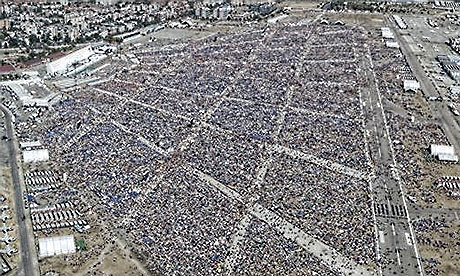Pope Benedict XVI arrived in Madrid for what is officially the 26th edition of World Youth Day, a total which includes off-year events organized, at least in theory, at the diocesan level. Counting just the massive international gatherings headlined by the pope, Madrid is the 12th World Youth Day since John Paul II launched the tradition in Rome in 1985.
Collectively, those gatherings have generated crowds in excess of 15 million people, making World Youth Day the Olympic Games of world religion: the largest regularly held international religious event on the planet.
“World Youth Day” is, of course, one of those charming bits of Catholic vocabulary that endures despite having thoroughly outlived its accuracy.
It was a single day back in 1985, but it’s morphed into a week-long jamboree composed of pilgrimage and devotion, catechesis, liturgies and the sacraments, and even Lollapalooza-style pop festivals. (The lineup includes “PriestBand,” an all-priest septet associated with the Emmanuel Community, which only performs at World Youth Days.)
“Evangelical Catholicism” is a term being used to capture the Catholic version of a 21st century politics of identity, reflecting the long-term historical transition in the West from Christianity as a culture-shaping majority to Christianity as a subculture, albeit a large and influential one.
I define Evangelical Catholicism in terms of three pillars:
- A strong defence of traditional Catholic identity, meaning attachment to classic markers of Catholic thought (doctrinal orthodoxy) and Catholic practice (liturgical tradition, devotional life, and authority).
- Robust public proclamation of Catholic teaching, with the accent on Catholicism’s mission ad extra, transforming the culture in light of the Gospel, rather than ad intra, on internal church reform.
- Faith seen as a matter of personal choice rather than cultural inheritance, which among other things implies that in a highly secular culture, Catholic identity can never be taken for granted. It always has to be proven, defended, and made manifest.
I consciously use the term “Evangelical” to capture all this rather than “conservative,” even though I recognise that many people experience what I’ve just sketched as a conservative impulse. Fundamentally, however, it’s about something else: the hunger for identity in a fragmented world.
Historically speaking, Evangelical Catholicism isn’t really “conservative,” because there’s precious little cultural Catholicism these days left to conserve. For the same reason, it’s not traditionalist, even though it places a premium upon tradition. If liberals want to dialogue with post-modernity, Evangelicals want to convert it – but neither seeks a return to a status quo ante.
Continue reading John Allen’s article on the Big picture at World Youth Day: ‘It’s the Evangelicals, stupid!’
